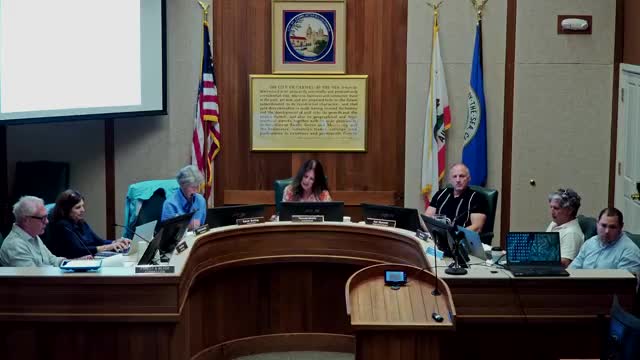Commission forms ad hoc committee to update tree-protection fines, seeks quick fixes and broader code changes
October 10, 2025 | Carmel-by-the-Sea, Monterey County, California
This article was created by AI summarizing key points discussed. AI makes mistakes, so for full details and context, please refer to the video of the full meeting. Please report any errors so we can fix them. Report an error »

The Forest and Beach Commission created an ad hoc committee to revise the city's tree-protection fine schedule, update tree-related code language and recommend enforceable penalties and incentives.
"What we're looking at doing is creating an updated and enforceable tree protection fine schedule," said Chair McKee while introducing the committee's scope, which includes fines for unauthorized tree removal, improper pruning or topping, construction-related tree damage, failures to comply with replanting requirements, and violations involving residential and city-owned trees.
Commissioners said the current fine schedule is outdated and recommended dividing the work into near-term changes and longer-term code updates. "If we feel as though things might take longer, just at least get a couple of the more important fines changed in an emergency order," one commissioner said during discussion.
Justin, the city forester, provided the code baseline the committee will use: native trees (pine, cypress, oaks, redwoods) and other native trees larger than 6 inches in diameter are protected by code; non-native trees larger than 10 inches are also protected. Commissioners discussed escalation for repeat offenders, fine ranges, and incentives for property owners who comply with maintenance or replanting requirements.
Timeline and process: the ad hoc committee hopes to complete its work within about four months and present recommendations to the commission and Planning Commission. Commissioners suggested the ad hoc group identify the top one to three fines that could be advanced quickly via emergency ordinance or a short path to council, while tabling more complex or controversial changes for later.
Public comment supported rapid action. Melanie, a member of the public, praised the committee's early work and urged swift progress, saying past enforcement had failed to deter some "egregious" tree violations.
Next steps: the committee will research regional best practices, assemble a recommended fine schedule, evaluate enforcement and implementation issues, and return to the commission with draft language and prioritized recommendations.
"What we're looking at doing is creating an updated and enforceable tree protection fine schedule," said Chair McKee while introducing the committee's scope, which includes fines for unauthorized tree removal, improper pruning or topping, construction-related tree damage, failures to comply with replanting requirements, and violations involving residential and city-owned trees.
Commissioners said the current fine schedule is outdated and recommended dividing the work into near-term changes and longer-term code updates. "If we feel as though things might take longer, just at least get a couple of the more important fines changed in an emergency order," one commissioner said during discussion.
Justin, the city forester, provided the code baseline the committee will use: native trees (pine, cypress, oaks, redwoods) and other native trees larger than 6 inches in diameter are protected by code; non-native trees larger than 10 inches are also protected. Commissioners discussed escalation for repeat offenders, fine ranges, and incentives for property owners who comply with maintenance or replanting requirements.
Timeline and process: the ad hoc committee hopes to complete its work within about four months and present recommendations to the commission and Planning Commission. Commissioners suggested the ad hoc group identify the top one to three fines that could be advanced quickly via emergency ordinance or a short path to council, while tabling more complex or controversial changes for later.
Public comment supported rapid action. Melanie, a member of the public, praised the committee's early work and urged swift progress, saying past enforcement had failed to deter some "egregious" tree violations.
Next steps: the committee will research regional best practices, assemble a recommended fine schedule, evaluate enforcement and implementation issues, and return to the commission with draft language and prioritized recommendations.
View full meeting
This article is based on a recent meeting—watch the full video and explore the complete transcript for deeper insights into the discussion.
View full meeting
